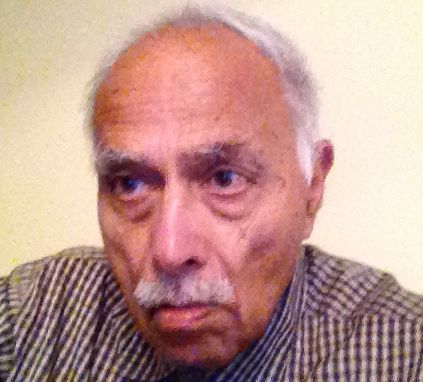A non-vegetarian life in the pre-1947 Punjab
Category:
Tags:
 Dr. Anand - an unholy person born in 1932 in the holy town of Nankana Sahib, central Punjab. A lawyer father, a doctor mother. Peripatetic childhood - almost gypsy style. Many schools. Many friends, ranging from a cobbler's son (poorly shod as the proverb goes) to a judge's son. MB from Glancy (now Government) Medical College Amritsar, 1958. Comet 4 to Heathrow, 1960.
Dr. Anand - an unholy person born in 1932 in the holy town of Nankana Sahib, central Punjab. A lawyer father, a doctor mother. Peripatetic childhood - almost gypsy style. Many schools. Many friends, ranging from a cobbler's son (poorly shod as the proverb goes) to a judge's son. MB from Glancy (now Government) Medical College Amritsar, 1958. Comet 4 to Heathrow, 1960.Widower. Two children and their families keep an eye on him. He lives alone in a small house with a small garden. Very fat pigeons, occasional sparrows, finches green and gold drop in to the garden, pick a seed or two and fly away.
In the time before the Punjab was partitioned, I lived in various towns and cities, and holidayed in a few.
When I was a toddler and up to my school-age, eating at home was mostly vegetarian plus two or three times a week, goat meat. On special occasions, we would eat chicken (kukkar in Punjabi, murga in Urdu/Hindustani)
Sometimes, I would be taken by a lady to her house in the afternoons, where I would play with her son who was a couple of years older. The family was Muslim. You might think, meat-eaters. It is not generally known that in those pre-WW2 days manual workers seldom had enough money to buy meat, except on special occasions. Daal Roti lunch and evening. Hence it was that Daal was known as the poor man's meat.
Goat meat for our kitchen came from a Jhatkai, i.e., a butcher who severed the animal's neck with one stroke. This was in contradistinction to a Halaal butcher who would have slaughtered the goat in the fashion prescribed by Islam. To my knowledge, the Muslim never Jhatka meat. Some Hindus did eat Halaal. The Sikhs never did. There were of course many Hindus who were vegetarian. One of my two grandmothers would consider her food to have been polluted if the container had even been touched by a kitchen implement used for a meat dish. Then, the "polluted" food had to be given away to a member of staff who did not hold such views.
There were no Jews (Yahudees) around wherever I lived. So, no kosher meat.
When I was three or four, I suffered from Pertussis (Whooping cough). It did not leave any lasting damage but the " whoops" were distressing and lasted a few weeks. There was no treatment. Someone suggested a folk remedy. Feed me on tilyar. The Tilyar is a bird half the size of a house sparrow. In those days - and I remember it well - the Tilyar swarms would settle in the evenings, on telegraph poles which ran along the Lahore-Sheikhupura railway line.
They would not have been courteous enough to drop in to a basket for me. Fortunately a Sikh farmer friend of the family had a shotgun and he very kindly provided Tilyars every day for several days. I stopped whooping. Whether naturally, or courtesy of the Tilyars, I know not. Our servant severed the neck. Jhatka.
When we children visited our maternal grandparents, they used to have a fair number of hens to provide us with eggs, and cockerels for us to eat. Jhatka.
When the wheat was ripe, quails used to descend en masse. There were professional quail catchers. At dusk they would, by permission, cast a net over whole of a field. Early in the ,
morning, they would hang a cage with a male quail in one corner of the field. The male quail, known as Bulllara in Punjabi, would "call". The call would attract the quails in to that corner. We would receive a share of the catch - for Jhatka.
Looking back, it seems a mean trick. The curried quails were delicious, but we could have survived without eating them.
Some years later, in north western Punjab, we also ate Titar (partridge). It was difficult to get hold of ready plucked partridge there. We had to buy live partridge and get it slaughtered by one of the two Jhatkais there .
Once we lived in a small town in Jehlum district, where there were scarcely any Sikhs. Hence, no Jhatka available. And we did not eat Halaal. A kindly lorry driver solved the problem. He would, when he happened to go to a town with a Jhatkai, ask the Jhatkai to wrap up the goat meat for us in a piece of cloth. On return, he would ask us to remove the parcel - he would not touch it, as it was not Halaal.
Is fish " vegetable"? We did not think so. But some Bengali acquaintances were fond of fish. They also claimed to be vegetarians . When we taxed them about it, they answered - but fish is Jal Toree. Correct, I suppose.
They were also fond of Jheenga and claimed, correctly, that Jheenga, being prawn, is not really fish.
______________________________________
© Joginder Anand 2016
Editor's note: I approve all comments written by people\; the comments must be related to the story. The purpose of the approval process is to prevent unwanted comments, inserted by software robots, which have nothing to do with the story. If you are unable to solve the puzzle below, please send an email to indiaofthepast@gmail.com, with your comment, stating which story the comment is related to.
Comments
Add new comment